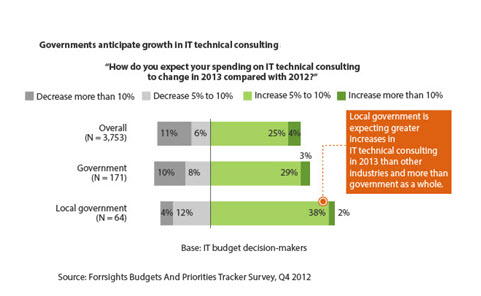Cities, Don’t Go It Alone. Service Providers Accelerate Smart City Projects.
Local governments – cities, counties, states – are investing in technology. Why? Well, a number of factors drive local governments to take a smarter approach to their administration and development: limited budgets, increasing citizen demands, competition for investment and jobs etc. Balancing competing demands on a shoestring budget isn't easy. City leaders are looking for ways to sustainably transformation city functions such as transportation, healthcare, public safety, utilities, or governance, and in aggregate the city as a whole. And, they increasingly value technology as a means to such a transformation. 
Fortunately, cities do not have to undertake this journey on their own, and they don’t expect to. In fact, according to Forrester’s Forrsights Budgets and Priorities Tracker Survey, local governments are more likely to expect increases in IT technical consulting than other industries (and more than governments as a whole): 38% of local government IT budget decision-makers expected a 5-10% increase in consulting spend and 2% expected an increase of more than 10%. Local governments are turning to the experts to help them figure out what this “smart city” thing means for them.
And, the good news is that there is someone to turn to. Over the past two to three years, service providers have invested in the smart city space to make their offerings more relevant to city challenges. In particular, reusable software assets enable them to provide faster solutions that reduce the implementation risks. In our new report, “Service Providers Accelerate Smart City Projects,” Fred Giron and I took a look at the recent trends in technology adoption in the city/local government sector and provide guidance to city CIOs on how best to leverage smart city service providers to help them along the path to becoming smarter.
We recognize that this is a dynamic market with new products and services launching regularly. Several of the vendors in the survey have new software assets that have come to market since our initial research study. Others who initially chose not to participate because they were “not ready” now have relevant product and services offerings. The report provides examples of what to look for. It certainly does not replace due diligence in vendor selection.
Fred and I both look forward to following the evolution of the market!